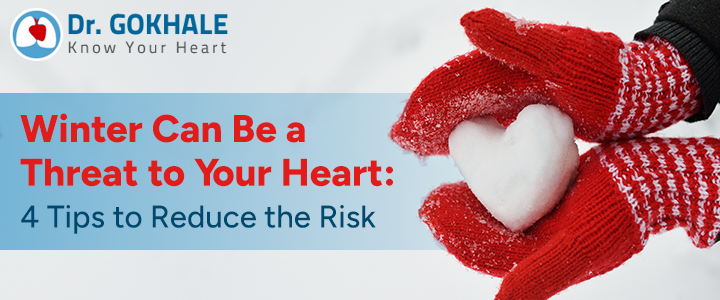“The risk of stroke, heart attack, irregular heartbeat, and other cardiovascular disorders and heart problems increases during the winter months. This risk increases significantly in older adults with a history of heart problems,” says cardiologist and heart transplant specialist in Hyderabad, Dr. Alla Gopala Krishna Gokhale.
Cold Weather Heart Risks: Why does the heart become vulnerable in winter?
The cold winter can impact the body in many ways, and every change the body makes to adapt to the cold winter can inadvertently affect the heart, even more so in the case of existing heart conditions. Here’s how:
- The cold temperature leads to the contraction of blood vessels, which raises the blood pressure, leading to an increased risk of stroke and heart attack, particularly in cases where the blood pressure is already high.
- The contraction of these blood vessels can worsen coronary artery diseases, leading to heart problems. Heart problems like angina and chest pain usually worsen when the coronary arteries get restricted.
- To regulate the body temperature in the colder months, our heart increases the heart rate to increase the warmth. This may cause problems in patients with existing heart disease, like heart rhythm disorders.
- Prolonged exposure to cold weather can lead to hypothermia, which doesn’t give the body enough time to generate warmth. In severe cases, this exposure can damage the heart muscle and may lead to cardiac arrest.
In addition to physical changes, in a few individuals, winter months can lead to season-related depression and stress, which may trigger unhealthy lifestyle choices that eventually strain heart muscles and cause cardiac problems, according to the best heart surgeon in Hyderabad, Dr. Alla Gopala Krishna Gokhale.
Winter Heart Protection Strategies- 5 Ways to Protect Your Heart during Winter:
Stay Away from Excessive Alcohol:
Excessive alcohol consumption during winter can lead to vasodilation, causing rapid heat loss leading to hypothermia. Excessive alcohol can also cause dehydration, suppress shivering response (which creates warmth), and impair judgment. So , always avoid excess alcohol consumption during winter.
Dress Adequately for the Weather:
In environments with rapidly fluctuating temperatures, it’s always safe to wear adequate clothing with multiple layers, scarves, and gloves. It’s easy to overlook dress, but the temperature drop can suddenly impact the heart, especially for older adults.
Avoid Physically Exhausting Activities:
Physical activities raise blood pressure while constricting blood vessels. Excessive exercise also reduces oxygen intake and increases the risk of hypothermia in winter conditions where the cold already impacts the heart. Always consult a heart surgeon before embarking on strenuous exercises in winter.
Stay Cognizant About Respiratory Conditions:
Winter is the season for the onset of respiratory conditions and infections, directly worsening heart health. Ensure all best practices to reduce the risk of respiratory infections and diseases during winter.
While these tips are mainly for winter cardiac care, it’s essential to take special care of the heart throughout the year to keep it strong. Stick to a heart-healthy diet, exercise regularly within specified limits, manage stress, and, most importantly, contact a heart specialist in case of any symptoms. If you are in Hyderabad, Dr. Alla Gopala Krishna Gokhale is the leading heart specialist and the best heart surgeon in Hyderabad who can help you improve your heart health. You can book a consultation for Dr Gokhale here.
 Ask Doctor
Ask Doctor
